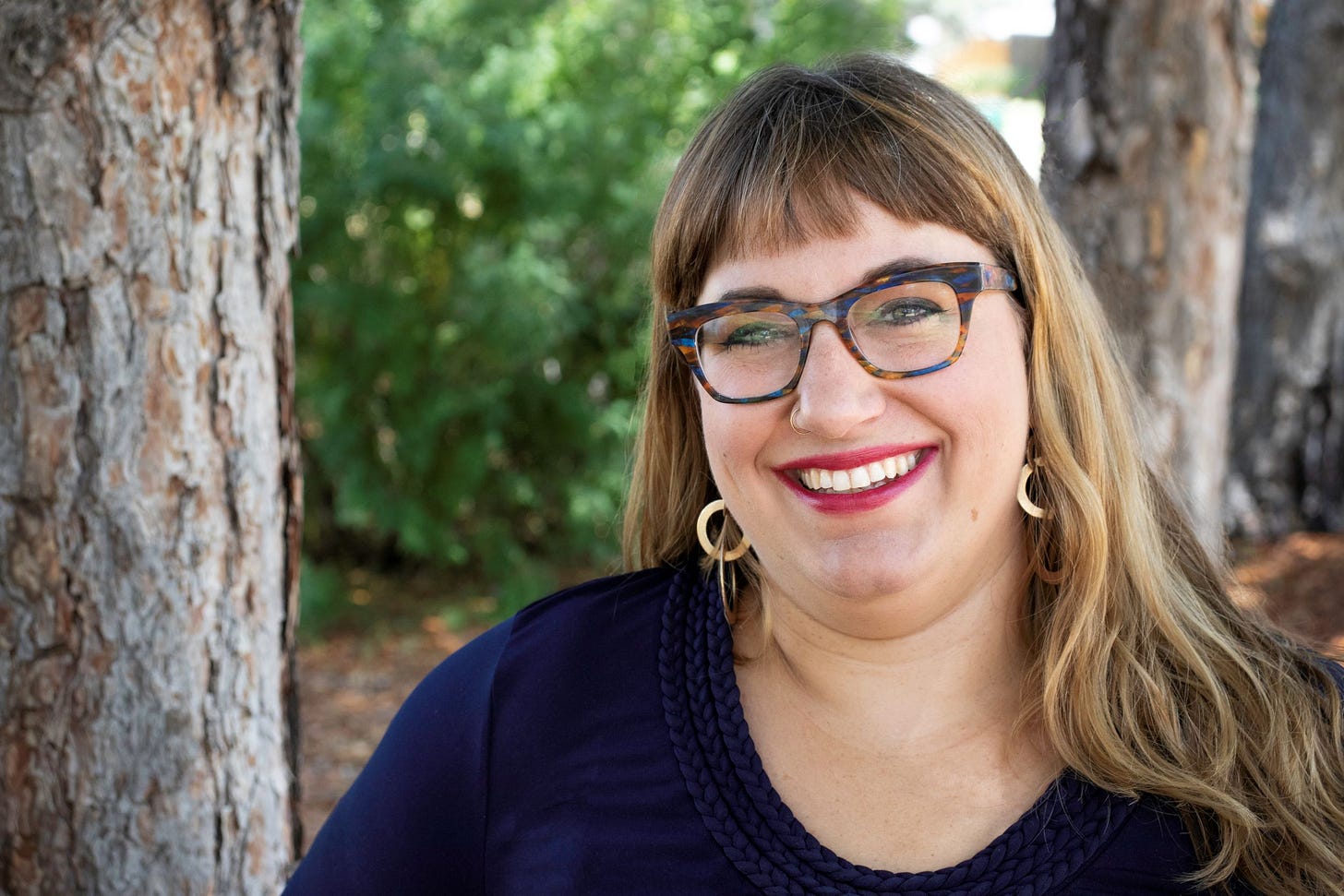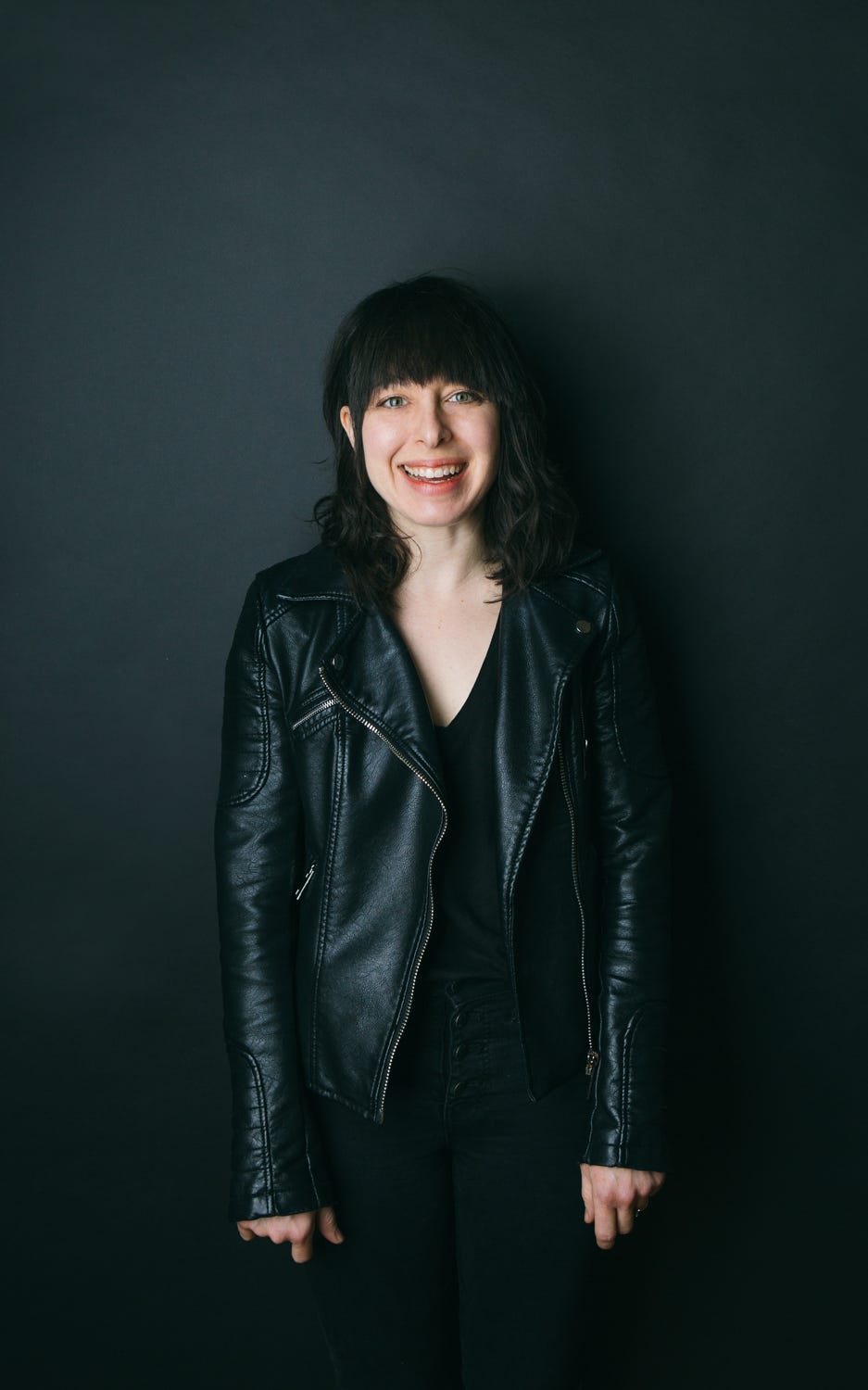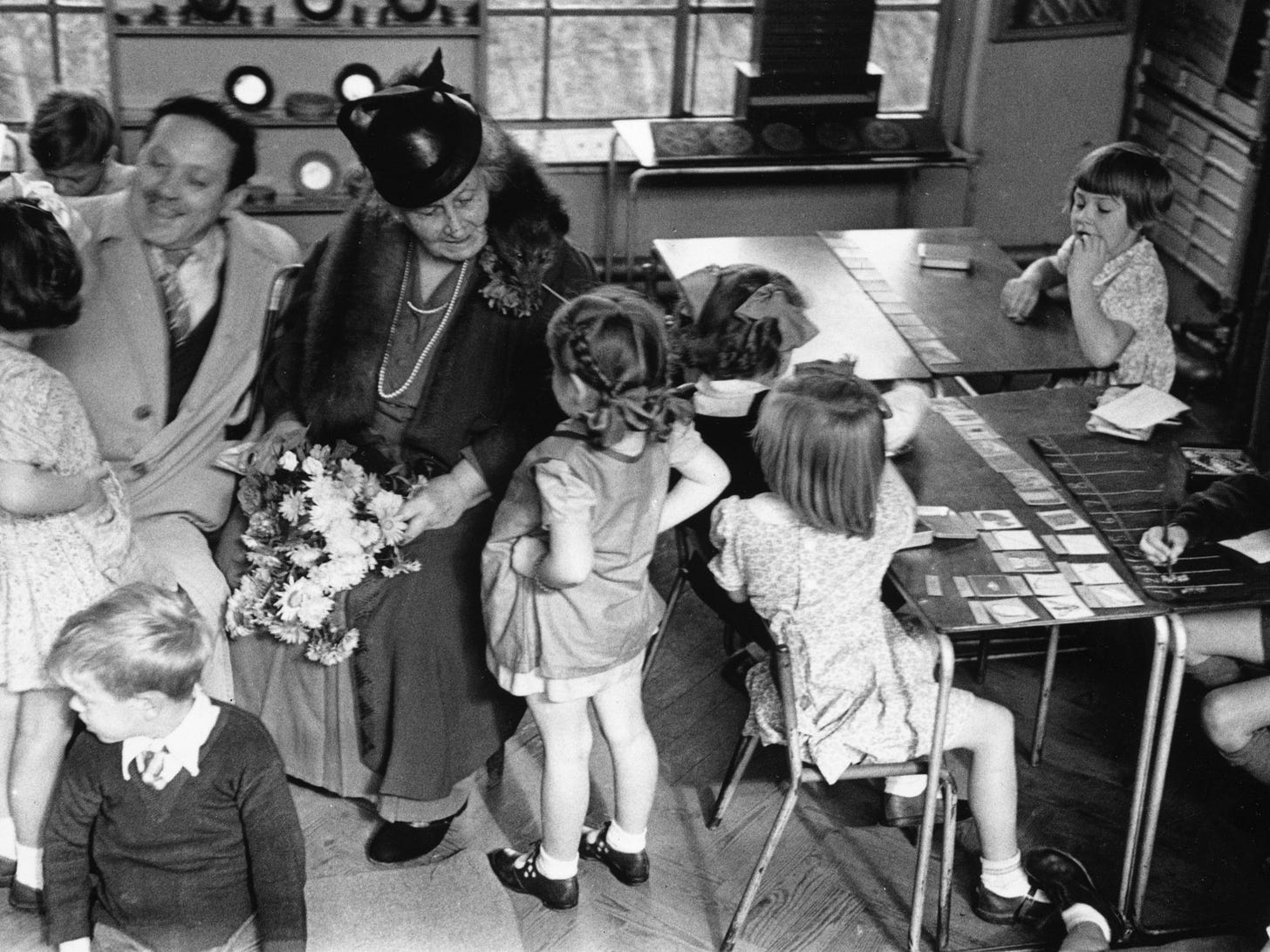the Empathy List #79: Sara Billups is a Seattle Christian Living in the Wake of Mars Hill Church
Evangelical Deconstruction Stories
This is a new series in which I’m sharing stories of religious deconstruction and reconstruction. If you find it compelling, would you share it with a friend?
Hello friend, Liz here.
Today, I’m delighted to introduce you to a fellow writer friend: Sara Billups, writer of one of my favorite newsletters, Bitter Scroll, and a NYT published author (her op-ed is titled, “There are evangelicals who stand against Trump. I’m one of them.”)
She happens to be a Christian in a city where a Very Famous Church Scandal took place (ahem). She’s also deconstructing (ish) and she’s still Christian, all of which I find fascinating. All that to say, I had a million questions for her.
I hope her words will be a balm in a season of EXCRUTIATING church splits and yelling matches. There are those of us who are walking in tandem, looking for Jesus and stumbling in the dark. You aren’t alone, friend.
Thanks for reading. Warmly, Liz Charlotte Grant
By the way… I WANT TO HEAR YOUR STORIES, too!
If you have a deconstruction/reconstruction story, I’d be grateful to hear from you! (REPLY to this email, or get in touch via my DMs or lizcharlottegrant@gmail.com.)
Sara Billups is Living in the Wake of Mars Hill Church in Seattle, WA
LIZ: First off, would you call yourself an “evangelical”?
SARA: I identify as a Christian. But what about an evangelical?
I was raised in the 80s and 90s in a non-denominational evangelical, suburban white Church. I attended an evangelical church in college. I’ve attended a Presbyterian church for 18 years here in Seattle. I could call myself a presby.
Or I could call myself an evangelical by process of elimination: I am not Catholic, Greek Orthodox, or Coptic Christian, so I am protestant. I believe in a literal resurrection and that Jesus performed miracles, so I am not from the liberal Christian tradition that may see those acts as symbolic.
For anyone following the cultural conversations around evangelicalism, there is both the idea of evangelicalism as a theological tradition and the functional definition that evangelicalism is synonymous with whiteness, celebrity pastors, and militant masculinity.
In the new IVP book Struggling with Evangelicalsim: Why I Want to Leave and What It Takes to Stay, the author, a pastor named Dan Stringer, makes the point that if we deny the word evangelical, we deny our responsibility to deal with its mess. Other folks would argue that there is no mess worth the clean up crew it would take to reform the evangelical church from within.
In fall of 2021, Kristin Du Mez noted in an NPR Politics podcast that most evangelicals have little actual interest in the theology that defines evangelicalism—in the Bebbington Quadrilateral, for example—but define evangelicalism culturally. The cultural associations have allowed the co-option of white evangelicalism by racism and toxic masculinity.
I said something about defining evangelicalism in a recent newsletter and heard from a reader who was baffled by the assertion that cultural evangelicalism has become dominant. We had a phone call after where she told me about her diverse and thriving evangelical congregation on the West Coast, assuring me that evangelicalism may be synonymous with racism and Republicanism for others, but not in her experience.
750 million people around the world identify as evangelical today. So there’s the important Western lens to acknowledge in this discussion as well.
So I can tell you the technical definition of evangelical, I can talk about the cultural distinctions of white American evangelicals, and then tell you the reasons why I'm not "that kind” of evangelical. But the entire process of explaining you’re not-that-kind-of anything is draining and of much less interest to me than moving forward and pursuing spiritual formation and community.
Honestly, I'm less interested in making a declaration that I am no longer an evangelical, or drawing a line in the sand and saying I can't use that word any longer.
And I say that as someone who is uncomfortable with ambiguity. I appreciate direct and crisp language and logical thinking that leads to clear identifiers.
Here is what I know for certain: I remain committed to the historic Christian faith. I believe in the trinity, resurrection, the virgin birth, and all the definitions of Christianity in the early church councils.
LIZ: How would you describe your experience in church growing up?
SARA: Growing up in the Rust Belt city of Fort Wayne, Indiana, my family always felt a little out of place, both inside and outside of the church. My dad is a Jewish Christian, converting in the 70s. There were about … zero other Jewish Christian families in our city in the 80s and 90s. We heard about one guy in Indianapolis, but that was it.
This framework — insider and outsider, in the church but a little different — became a point of both distinction and alienation for my parents that impacted me. Born an introvert, a self-aware enneagram 4 that starts most sentences with “I feel,” my personality only reinforced the desire to be special yet anonymous that was mirrored in my family of origin.
My parents made a lot of mistakes, first and foremost showing me The Exorcist in seventh grade.
I was raised with a lot of fear of the end times and was told the world would probably end before I could get married or have kids.
My parents also did a lot of things right. “We always had a lot of love,” dad often says when we talk about my upbringing.
I met my husband Drew, who couldn’t be more different from dad, freshman year of college. We attended Taylor University, located in a speck of an Indiana town called Upland. I was 18, Drew was 19. We’ll celebrate our 20th anniversary this fall.
Drew and I were very involved in the late 1990s/early 2000s in a small church in Muncie, Indiana led by a pastor influenced by the Jesus Movement. The church was not especially charismatic on Sunday mornings, but we were welcome to practice gifts of the spirit and there was a beautiful focus on prayer with Sunday night meetings that often lasted for hours.
LIZ: How did you reconcile the church experiences you'd had with those you witnessed, especially considering you had a bird's eye view on Mars Hill's impact within Seattle?
SARA: We arrived in Seattle 17 years ago with friends to try living in intentional community. Three families drove in a caravan from Indiana through Omaha, Denver, Jackson Hole, and Twin Falls to Seattle.
Drew and I landed in a Presbyterian church the first Sunday we arrived in Seattle and have been attending the same congregation ever since. These days, I’m a deacon and value being able to meet and pray with folks and help meet practical needs alongside a team of volunteer church leaders. My church has a vibe that is very good for: people who lean sad, introverts, bookish folks, and lovers of liturgy and Sufjan Stevens. But seriously, we are a group of big-hearted people mostly with our heads down, living quiet lives and loving people the best we can.
Yet the truth is, while my Sundays have had a steady rhythm in the same pews for 17 years, my identity as a Christian in Seattle has been more complicated. I got really good at living parallel lives, as a Christian on Sundays and a person walking downtown to a job at an art book publisher wearing vintage cardigans the rest of the week.
I had moved from a small town in Indiana where cultural Christianity was the norm and aesthetics and culture were harder to find to a large city brimming with fresh food, good coffee, so much art and music and culture.
Having spent time in New York and San Francisco earlier in life, I expected some shift in being a city Christian, or whatever. But the sense of hostility against Christianity in Seattle when we landed in the mid-2000s was tangible and grew over the years. It was whiplash-y, the speed at which we arrived in Seattle and our faith began to experience a certain pressure. I coped by hiding all light under a bowl.
We didn’t understand for some time how quickly, as John Mark Comer and Mark Sayers talk about in their “This Cultural Moment” podcast, the city had assimilated us.
I had some pretty serious a-ha moments after listening to “The Rise and Fall of Mars Hill” podcast as a Christian living in Seattle. Specifically, that the early animosity we felt when moving here, the intensity of it, was very directly linked to Mark Driscoll and his stated pride at his church being in Seattle—at turning our football field into a Sunday service one Easter Sunday. At having a church of families who could make a lot of babies, who could then go on to make Seattle a city of mostly white Christian kids.
That Mars Hill ethos was a curiosity to a lot of Seattle residents. It was definitely cringey for us Christians at other churches looking in from the outside.
The Mars Hill beat was also very good click bait. Articles in local alt weekly The Stranger ran with titles like “Church or Cult? The Control-Freaky Ways of Mars Hill Church” and “How Christianity Infiltrated Seattle Music with a Little Help from Mars Hill Church and the City Council” (with a brilliant subhead: “smells like holy spirit). Mars Hill was a threat to Seattle, but not really. Mars Hill was its own rager. It was comedy and tragedy that left a ton of damage in its wake.
But what happened after it fell apart is that members either left church, took a break, or joined or planted other congregations.
There is deep trauma and open wounds in many friends who attended Mars Hill. These are beautiful, bright-hearted people who experienced some form of spiritual abuse, and many who are navigating what happened today.
And of course this story scales across many cities, many churches, in several geographies. The wounds are deep and wide.
LIZ: What reforms do you hope to see within American evangelical systems?
SARA: I mull over these questions a lot. The best way to get clear on reform is to first fully uncover what we’ve done wrong and publicly repent. The second is to imagine a new way forward that’s led by prayer and discernment. Right now, we’re in the midst of a time of upheaval in the American Church and the dust has not settled enough to see what is taking shape. I think that denominations will split, new organizations and alliances will form, current lines will blur and then coalesce in new shapes.
We don’t know yet what that means practically, or what that means for the future of American Christianity.
But I do know the best way to begin to imagine where we go from here is to do a lot of listening.
I’ve asked folks to share ideas for what the American church needs to do to reform. I got dorky and made a spreadsheet with answers, because there are many big and bold and tender and true ideas.
The through-lines are to stop making Sunday service a big production. To bring back accountability and guard rails for pastors.
To be a place that makes welcome—to use the well-worn analogy—to become a church that builds wells where folks can find Jesus like a cool drink and not fences to keep us in the church walls. The fences are broken, and they should come down.
We need to hear the stories of people of color, of people with disabilities, of people from every creed and gender and background. Artists and musicians, a new wave of patronage of the arts.
We need Christian elders and mentors bringing up Christian young people. We need a refreshed Christian community, like practical daily life with people we wouldn’t choose but end up loving as dear friends.
And we need to acknowledge that in pockets, in single congregations, there are Christians bearing the best of these ideals now. It is already happening, this kind of practical service and love. Thank God, these congregations are led by pastors who aren’t getting pumped for a viral tweet.
LIZ: Would you say that all of these things have led you to “deconstruct” your Christian faith?
SARA: As for deconstruction, the term has evolved in the past couple of years, its connotation has shifted and it’s been interesting to see who uses the word and in what context. For me, if, when we say deconstructing, we mean the process of prophetically critiquing the failures of the church and its impact on our own spiritual practice with the goal of holding power to accountability and moving towards Jesus—to heal and refine ourselves towards holiness—yes.
Count me in alongside a long line of Christians who have navigated a dark night of the soul and pushed for reform. I’m drawing inspiration from folks here like St. Francis or St. John of the Cross who have cried out and said, “Where are you God?”
But I’m less interested in wearing the word deconstruction on a sash over my arm, or getting stuck on language or being quick to react when someone gets plucky online.
In general, I’m much more interested in trying to move forward in gracious, compassionate hope as a person who follows Jesus. We’re in a time of change in the Church. We’re looking for new language. You could call that reconstruction or get kinda literary: A stream in the desert. A cup of cold water. A clearing in the wilderness.
LIZ: What church legacy do you hope to leave for your own children?
SARA: My husband and I recently had a couple in their 20s who joined our home church for a backyard happy hour. We listened to their story about navigating the city as Christians. During the gathering, my 11-year-old son joined us around the fire and started to listen, too.
We had been chatting with these friends about the idea of normalizing doubt, and how we’re trying to raise our son in a home that is both joyfully centered on Jesus and yet is eager to hear his questions.
We want our kids to develop a spiritual health that is built on curiosity and not being afraid to question. We’d like the Church to take the same posture, as a spiritual home that celebrates seasons of consolation as well as offers community during seasons of desolation.
We’d like to help build a church that welcomes doubt, skepticism, and offers companionship during times of walking in a spiritual desert.
By God’s mercy, we’ll walk out in the field with our son when he strays, and we’ll walk back home together, too. A full circle: go out, question, pray, come home. Again and again.
My hope is that the Church will make welcome not just Christians coming up like my kid, but make welcome all people who love Jesus and want to live lives of service and lead with love.
__
BIO: Sara Billups is a Seattle-based writer. Her work has appeared in The New York Times, Christianity Today, Ekstasis, and in Bitter Scroll, her monthly newsletter. Sara is completing her D.Min. in the Sacred Art of Writing at the Peterson Center for the Christian Imagination at Western Theological Seminary. Her first book, Orphaned Believers, is forthcoming from Baker Books. You can find her on Instagram and, occasionally, Twitter.
Liz’s Curious Reads
#1 We need a word for mothers whose children have died.
Dr. Karla F. C. Holloway’s search for this word—vilomah, from Sanskrit—inspired me to write this essay.
#2 If you’re black and you get doxed by white supremacists, you win every conversation for the next 3-5 months, as in this imagined dialogue:
Me, as if passing a spork: Oh, by the way, here’s my new number.
You, unaware of your impending demolition: Ha! You a big deal now, huh? Can’t even keep your old number like us common folk do.
Me, itching for the kill: Yeah … I actually had to change it because I was doxed by white supremacists.
You, now a gelatinous pool of humanoid sludge, attempting to speak, but physically unable to make intelligible words: aaaaaaaaaaargggggggggg
The other benefits of a dramatic doxing? You mercilessly cut down your contact list, you’ll never be bored another day in your life, …and you join a clique of other doxed folks. So, that’s fun.
#3 On Maria Montessori, the strange woman behind the teaching method.
Part of Montessori’s approach is to take the bodies of children seriously. When Montessori… agreed to take on a project running a school in the poor neighborhood of San Lorenzo, she finds there is very little money, so there will be no desks—and Montessori likes that. Rather than put the children in adult-size desks, she has child-size furniture made. Sinks and mirrors are installed at the children’s height. Aprons are made with buttons in front, so the children can button them without help. And the children are given sandals that are easy to take on and off.
“But it’s a children’s house!” exclaims a visitor who comes to see the school.
#4 Say you’re back country skiing, and you lose track of time or location or danger, and suddenly a mountain of snow is dumping on top of you: an avalanche.
These are the guys who will dig you out.
The story of an avalanche rescue team in the Swiss alps that’ll give you the shivers (or a panic attack… so, read at your discretion).
—GQ
#5 Oh, wait, the winter Olympics are actually happening?
In case you’re out of the loop (like I was!), here are seven new events that will premiere at this year’s Beijing Games.
—NPR
Just for fun…
“The guy’s a frickin’ genius… MacGruber!”
Will Forte as a right wing extremist on SNL is hilarious annnnnd a bit too close for comfort. But also the hardest I’ve laughed in a while so……. enjoy?










